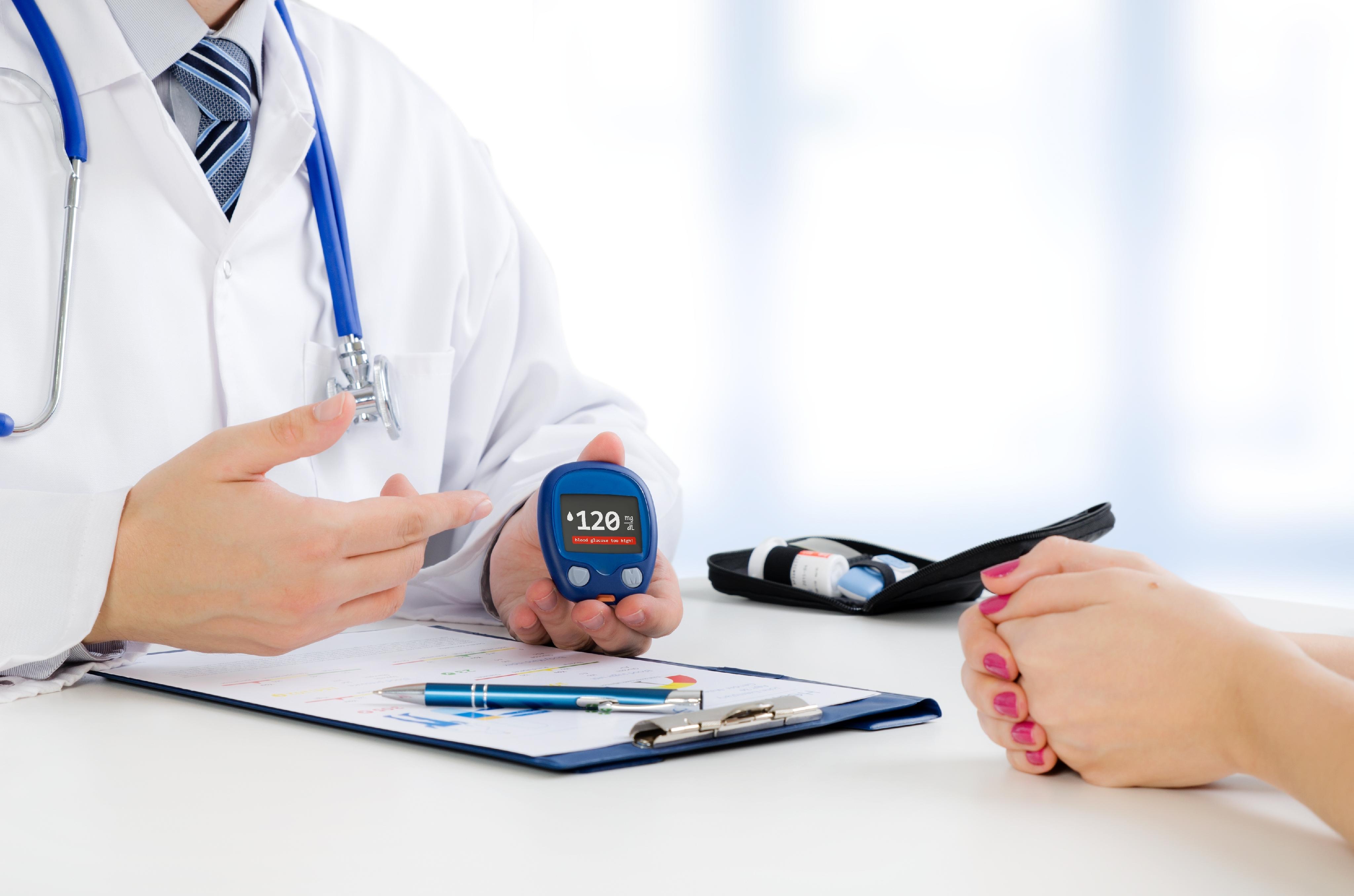- 30-Nov-22
Diabetes is a chronic condition that develops when the pancreas is unable to create insulin or when the body is unable to effectively utilise the insulin that is produced.
The pancreas produces the hormone insulin which functions as a key to allow glucose from food to enter the cells of the body where it may be used to make energy. All foods containing carbohydrates are converted into glucose in the blood. Cells can more easily absorb glucose when insulin is present. Blood glucose levels rise due to ineffective production and use of insulin (known as hyperglycemia). Long-term elevated glucose levels are linked to cellular deterioration, organ and tissue failure.
Diabetes Meaning in Urdu
ذیابیطس - ایک ایسی بیماری ہے جس میں جسم میں مناسب مقدار میں شوگر نہیں بن پاتی جس کی وجہ سے خون میں شوگر کی سطح میں مسائل پیدا ہو سکتے ہیں۔ اس سے جسم کے دیگر اعضاء کو نقصان پہنچ سکتا ہے۔ ذیابیطس ایک ایسی بیماری ہے جو بہت سی دوسری بیماریوں کا باعث بن سکتی ہے۔ یہ پوری دنیا میں تیزی سے پھیل رہا ہے۔ اس بیماری میں مبتلا لوگوں کی ایک بڑی تعداد ہے۔
Types of Diabetes:
Diabetes can come in three different forms. Gestational, type 1, and type 2.
Type 1: Diabetes can manifest at any age where children and adolescents are most commonly affected.When you have type 1 diabetes, you need daily insulin injections to maintain blood glucose levels because your body either produces very little or no insulin at all.
Type 2: Adults are more likely to develop type 2 diabetes which makes up around 90% of all instances of the disease.When you have type 2 diabetes, your body does not utilise the insulin it produces effectively. Living a healthy lifestyle that includes greater activity and a balanced diet is the cornerstone of type 2 diabetes treatment. However, the majority of people with type 2 diabetes will eventually require oral drugs and/or insulin to keep their blood sugar levels steady.
Gestational: The condition known as gestational diabetes (GDM), which can be problematic for both the mother and the growing child, is marked by high blood glucose levels that develop during pregnancy. GDM often goes away after pregnancy but both the affected mother and their offspring are more likely to acquire type 2 diabetes in the future.
Symptoms of Diabetes:
The onset of diabetes is accompanied by an increase in blood sugar.
General symptoms - Diabetes' typical signs and symptoms include:
- Increased hunger.
- Increased thirst.
- Weight loss.
- Frequent urination.
- Eyesight that is fuzzy.
- Extreme tiredness.
- Unhealed wounds.
Diabetes Symptoms in Men:
Men with diabetes may experience the following symptoms in addition to the usual symptoms:
- A diminished desire for sexual activity.
- Erection issues (ED).
- Inadequate muscular strength
Diabetes Symptoms in Women:
Diabetes in women can cause symptoms like:
- Sexual dryness.
- Infection of the urinary system.
- The presence of yeast.
- Dry skin that itches.
Treatment of Diabetes:
Doctors treat diabetes with several different medications. Some are taken by mouth while others are available as an injection.
Type 1 Diabetes:
The most effective medication for type 1 diabetes is insulin. Your body is unable to manufacture the hormone that it replaces. People with type 1 diabetes commonly use different types of insulin. They differ in how quickly they start to work & how long their effects last:
Rapid-acting insulin: Starts working within 15 minutes and its effects last 2 to 4 hours.
Short-acting insulin: Starts working within 30 minutes and lasts 3 to 6 hours.
Intermediate-acting insulin: Starts working within 2 to 4 hours and lasts 12 to 18 hours.
Long-acting insulin: Starts working 2 hours after injection and lasts up to 24 hours.
Ultra-long-acting insulin: Starts working 6 hours after injection and lasts 36 hours or more.
Premixed insulin: Starts working in 5 to 60 minutes and lasts 10 to 16 hours.
Type 2 Diabetes:
Some people can manage type 2 diabetes with the aid of diet and exercise. If altering your lifestyle is not enough to lower your blood sugar levels, medication will be required.
Pregnancy Diabetes:
If you are diagnosed with gestational diabetes, you will need to monitor your blood sugar level several times a day during your pregnancy. If it is high, dietary changes and exercise may be enough to lower it.
Research has found that about 15% to 30% of women tend to control their pregnancy diabetes with the help of exercise and change in food intake.
Women who develop gestational diabetes will need insulin should exercise and dietary changes not help as Insulin is safe for a developing baby.
When to see a Doctor?
If you experience any possible symptoms of diabetes, contact your healthcare provider. The sooner an illness is identified, the sooner it can begin to be treated.
Best Diabetes Doctor in Lahore
IMC Hospital is one of the most prestigious institutions in Pakistan which is known for its performance and outstanding results regarding Endocrinology, Diabetes. Here you find one of the best Endocrinology, Diabetes specialist in Lahore Pakistan. Visit today and book your appointment at Integrated Medical Care Hospital (IMC Hospital).
Dr. Shehzad Ul Haq MD, FACE (USA)
Consultant Endocrinology, Diabetes, and Metabolism, Diplomate American Board of Internal Medicine, Diplomate American Board of Endocrinology, Fellow American College of Endocrinology.
Specialities: Endocrinology
Areas of Focus - Diabetes Mellitus, Hypertension, Hyperlipidaemia, Thyroid Disorders, Obesity, Growth Disorders, Infertility Disorders, Abnormal Hair Growth, Erectile Dysfunction, Male and Female Hormonal Disorder.
Introduction - Dr. Shehzad Ul Haq did his MBBS from King Edward Medical University, Residency in Internal medicine from the University of Louisville. KY, USA, Fellowship in Endocrinology Diabetes and Metabolism from Marshal University, WV, USA. He is a Diplomate American Board of Internal Medicine, Diplomate American Board of Endocrinology Diabetes and Metabolism, and a Fellow American College of Endocrinology. Dr. Shehzad was named “America’s Top Physician” By Consumers Research Council, the USA in 2007. Dr. Shehzad has worked as a Consultant Physician, at Gisborne General Hospital, Gisborne, New Zealand, and a Consultant Physician at Mersey Community Hospital, Davenport, Australia. He is the Director of Diabetes Centre at Central Mississippi Medical Centre, Mississippi, USA. He was also the Consultant Endocrinologist at Doctors Medical Center, Modesto, USA, LOCUM Consultant Endocrinologist at Great Plain Hospital, North Platte, NE USA, and, LOCUM Consultant Endocrinologist at Sutter Pacific Medical Foundation, Santa Rosa, CA USA. Dr. Shehzad Ul Haq has been practicing in Lahore and providing services in Diabetes Mellitus with an interest in Insulin pump therapy especially for young Type 1 Diabetes, Hypertension, Obesity, Disorders of Male and Female Hormonal issues, Thyroid and Parathyroid Gland Disorders, Lipid Abnormalities, Pituitary Gland Disorders, Growth disorders, Abnormal Facial Hair Growth.

 Map
Map










